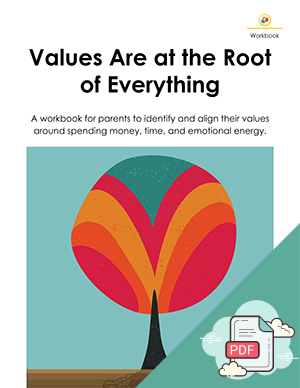If you’re a child of the 1980s, you might remember a certain anti-narcotics PSA that showed a mustachioed dad confronting his teenage son with a box of drug-related paraphernalia. “Who taught you how to do this stuff?” he asks. Eventually, the son shouts back the now-infamous phrase, “I learned it by watching you!”
The commercial made me laugh as a kid, it all seemed so melodramatic. But now that I’m a parent, I imagine my son saying that last line all the time. My husband and I spend a tremendous amount of time thinking about our family values. Our virtues, eccentricities, and, unfortunately, all kinds of habits we don’t wish to pass on to our children, are on full display because as we all know, our kids are always watching.
As parents, we owe it to ourselves and our families to take a hard look at what we’re teaching.
Identifying Your Family Values
Before you became a parent, did you have an idea about what kind of parent you wanted to be? The ways in which you internally defined “good parenting” reflect some of your values.
Perhaps those are what we would more traditionally assign as family values, like being kind, listening, eating meals together, or having elaborate holiday family traditions.
If someone were to ask you what your personal values are, how would you respond? Honesty? Integrity? Those are sort of the same thing, aren’t they? Sense of humor? That’s more of a quality than value. Health? Okay, we’re getting there. Religious faith? For some, that’s a big deal. You’re on the right track, though.
How about adaptability? Reliability? Financial stability? There’s so much to think about. And really, those are all family values too.
Unlike the saccharine endings of most ’80s TV family comedies (I’m looking at you TGIF lineup), teaching our children all of these values we supposedly have isn’t so easy as sitting down on their bed each night and giving a heartful speech. If we’re lucky, that may happen a few times.
We mostly pass on our values in an unconscious way through our everyday interactions, simple conversations, and how we use our resources like time, money, and attention.
Here are six unexpected ways we teach our values to our children. If you think you might need some help redefining your values or getting in sync with your partner, stick around to the end for a pleasantly sweet surprise.
Unexpected Ways We Teach Family Values

01 – The Way We Keep Our Homes
How and what we keep in our homes is an open display of what we value spending our time and money on. Is your home generally tidy or a dusty hot mess? Do you keep knickknacks everywhere or scale back with carefully chosen decor?
The individual items themselves, like books and films, also send a message to our kids about what we think is worth our attention.

02 – By Having Family Meetings
So maybe this one isn’t so unexpected as a way of teaching values. The unexpected thing is really whether your family has meetings or not.
If recent events have taught us anything, it’s that being vocal and actively engaging in conversation about what we believe and cherish is one of the most important ways we can educate our children.

03 – In the Ways We Handle Conflict
The way we handle conflict can signal a sense of trust and resiliency and a desire to calmly and respectfully engage. Or, it can signal your value to be right and in charge.
Your method of discipline (natural consequences vs. grounding, for example) is included here. Our guide “8 Secrets to Creating Your Ultimate Family Team” includes a very useful four-step process for respectfully resolving conflict.

04 – Our Choices for Family Activities
Are you a museum family or an amusement park family? Are you a camping family or an all-inclusive resort family? Do you let your children help plan your summer activities, or is everything handled by the adults?
There’s nothing necessarily right or wrong about any of these options. Just remember that where you go and what you do when you get there says a lot about your priorities and your family values.

05 – Our Short- and Long-Term Expectations
In the short term, what do you expect of your children while they’re living at home? Should they only be responsible for schoolwork and certain household tasks, or is teaching broader life skills part of their home education? In the long term, are there only a handful of jobs you’d find acceptable for your kids to pursue?
Your narrowness or openness about what is appropriate to define success can define how a child sees themselves for the rest of their lives.

06 – How We Show Love and Affection
This encompasses not only physical affection (though that’s a big part) but also our small acts of love, the notes, the extra scoop of ice cream, and the blanket after falling asleep on the couch.
It includes the words we use and the decisions we make to postpone our own demands and at least listen to our children when they express a genuine need.
Aligning Family Values Moving Forward
It’s human nature not to think about something until it’s a problem. Many of us ignore our health until we’re in pain. We may not think about the importance of saving money until we’re holding a hefty bill in our hands and can’t afford to pay it.
Consciously identifying our values, making sure we’re aligned with our partners, and applying those values in a consistent and systematic way to our family life can easily slip through the cracks. It doesn’t have to be that way anymore. Proactive parents like you can do things differently.
Make that “I learned it by watching you” moment a point of joy and pride. No matter what ages your children are, it’s never too early or too late to start the process.
Our workbook can help with every stage of the process.
Values Are at the Root of Everything
A workbook for parents to identify and align their values around spending money, time, and emotional energy.
- Designed for parents to do together
- 16 page PDF workbook
- Includes 4 exercises to agree on values and how they apply to choices in our daily lives regarding how we spend our money, our time, and our emotions
What To Do Next
1. Read more in the blog:
The Family Wisdom Blog shares valuable ideas across diverse topics.
2. Explore the Printables Library:
Our printables library is filled with must-have activity ideas, checklists, guides, and workbooks.
3. Subscribe to Our Newsletter:
Sign up for our newsletter for parenting tips to help you create the family team you've always wanted.
Somer Loomis
Somer is the Chief Content Officer at Raising Families living in Southern California with her seven-year-old son and two-year-old daughter. She spent 10 years in the architecture field as a designer and medical planner and now applies her love of integrative thinking and big-picture planning to her family and career.
In her free time she loves to try new recipes she knows her children will never eat and do art projects she saved on Pinterest at least five years ago. Read full bio >>






